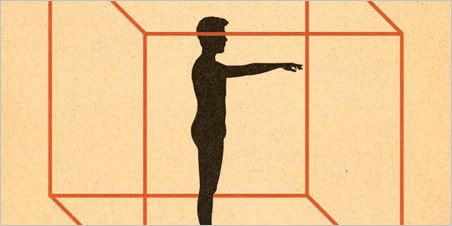
“Powerlines“
from the album The Interiors
2008
The Interiors’ forthcoming self-titled album was nearly the Chicago band’s swan song. The day the trio inked a deal last spring with 54º40′ or Fight!, singer/guitarist Chase Duncan lost the tip of his left index finger when a metal door slammed on his hand.
“We finished [the record] Monday and signed on Wednesday,” says drummer Brian Lubinsky. “But after [Duncan’s injury] we weren’t sure if he’d be able to play again.”
For nearly two months the band remained in suspended animation, unsure if its frontman would recover. “The ends of the nerves were ripped off,” says bassist Collin Jordan. By late fall 2007 Duncan’s hand had healed to a point that he could again play his instrument, though the guitarist still struggles with some tunes. When the Interiors finally reconvened for a handful of small shows in January, all of its members struggled as the band tried to recapture that initial chemistry (“We could hardly play,” says Jordan).
But, starting with a memorable show at a Humboldt Park liquor store, the trio began to rediscover its mojo. Playing behind the store’s bar (“All the owner wanted was noise coming out of the store to let people know he was open past 10” p.m., recalls Lubinsky), the trio quickly won over the diverse audience.
A lot of the group’s swagger comes from the innate chemistry in its swinging rhythm section. Its bassist, Jordan, grew up playing the drums and majored in percussion performance in college. Drummer Lubinsky, meanwhile, grew up strumming a bass guitar. That knowledge of one another’s instruments allows the two to play off one another on tracks like the snaking “Powerlines,“ where Lubinsky’s off-kilter drumming provides a counterpoint to Jordan’s bobbing, hypnotic bass lines.
“We’re as much an R&B rhythm section as a rock one,” says Lubinsky. “I’ll steal beats from ’50s New Orleans soul records.”
The band, which started playing together in 2004, claims a diverse array of influences, from Chuck Berry, R.E.M. and Sonic Youth to Ethiopian manzuma. On “A Crooked Line” the drummer even freely cops to aping a South African beat. But these aren’t mellow tunes in the vein of indie darlings Vampire Weekend — not with Duncan’s sneering vocals, jagged guitars and socially charged lyrics leading the charge.
“We’re in music, not politics,” says Lubinsky, tempering the band’s political aspirations.


